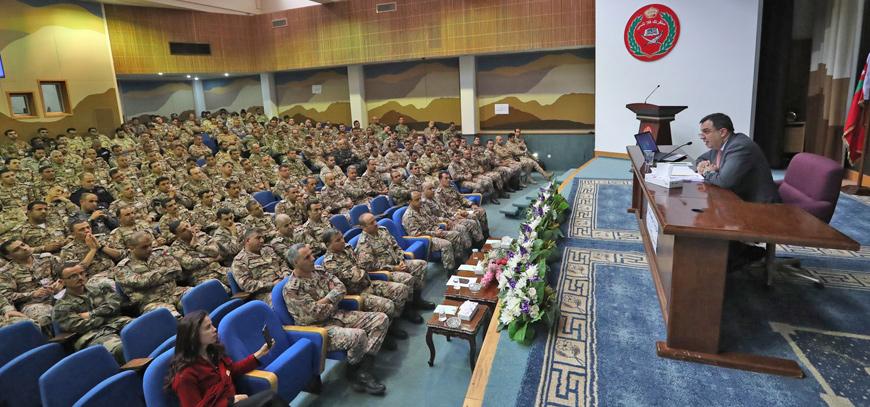You are here
Fakhoury gives account of repercussions of regional crises at dialogue session
By JT - Oct 28,2017 - Last updated at Oct 28,2017

Minister of Planning and International Cooperation Imad Fakhoury speaks during a dialogue session organised by the Talal Abu-Ghazaleh Knowledge Forum (Photo courtesy of Planning Ministry)
AMMAN — The Talal Abu-Ghazaleh Knowledge Forum (TAGKF) has hosted Minister of Planning and International Cooperation Imad Fakhoury in a dialogue session that addressed the repercussions of the regional crises on the national economy.
Since 2011, Jordan has faced several unprecedented external shocks that affected the economy, Fakhoury said, noting that the repercussions that the Kingdom has incurred were mainly results of the “so-called Arab Spring” and hosting hundreds of thousands of Syrian refugees, according to a ministry statement on Saturday.
Other burdens include losing main markets of exports and the interruption of gas supplies from Egypt, which costs Jordan around JD5.5 billion and contributed to increasing debts, the minister added.
He said that economic growth rates went down from more than 6 per cent between 2000 and 2010 to almost third the during the past seven years, and that unemployment went up from 12 per cent in 2010 to 18 per cent in the second quarter of 2017.
The interruption of Egyptian gas supplies, which used to generate 90 per cent of the Kingdom’s electricity, was accompanied with a hike in international oil prices reaching $120 per barrel and more than $140 in some periods, Fakhoury said, adding that Jordan imports 97 per cent of its energy needs.
The annual subsidy for oil derivatives then increased to $800 million per annum, and to $2 billion for electricity as a result of using diesel and fuel oil in generating power, where electricity generating costs went up by 500 per cent, he added.
The bill for importing oil and its derivatives constituted around 22 per cent of the Kingdom’s gross domestic product, the minister noted.
The direct cost of hosting 1.3 million Syrian refugees — whose number is currently estimated at 1.4 million — reached $10.5 billion over the past seven years, standing annually at $1.5 billion, constituting of 4 per cent of GDP and 16 per cent of the yearly government revenues.
The indirect cost, according to a joint study by UNDP and the TAG-KF, stands between $3.1 billion and $3.4 billion each year, he added.
The government embarked on resorting to renewable energy and shale oil projects to generate electricity, Fakhoury said, expecting the percentage of imported energy to drop to 90 per cent by December.
He added that current schemes will continue until the country is able to generate 20 per cent of its power needs from renewable energy sources by 2020.
Fakhoury said that the debt-GDP ratio increased from 62 to 95 per cent over the past seven years with annual average of 5 per cent, due to the external events Jordan has suffered from, noting that financial reforms contributed to maintaining the percentage for this year.
He also went over the Jordan 2025 Document, which identifies the general framework that will govern economic and social policies based on granting opportunities for all.
Among the main bases of the document are citizens who constitute the principal component of the development process. People can help build economy that relies on competitiveness and expanding exports, enhance the rule of law, increase participation in decision-making and boosting self-reliance, among others, the minister noted.
Referring to the 2018-2022 Economic Growth Stimulation Plan, he said it aims at restoring momentum of economic growth and utilising Jordan’s development potential within four main aspects: overall stability of the national economy, competitiveness and investment, infrastructure and economic sectors and social development.
The plan includes 95 procedures that are related to government reforms and 85 government projects with a total value of JD6.9 billion, according to the minister.
Related Articles
AMMAN — Jordan hosts 3.5 million refugees, constituting 15.6 per cent of the world’s refugee population, Planning and International Cooperat
AMMAN — Minister of Planning and International Cooperation Imad Fakhoury on Tuesday took part in the European Bank for Reconstruction and De
AMMAN – The Jordan Strategy Forum (JSF) has released a position paper on alternatives to increasing the electricity tariffs in Jordan, recom

















